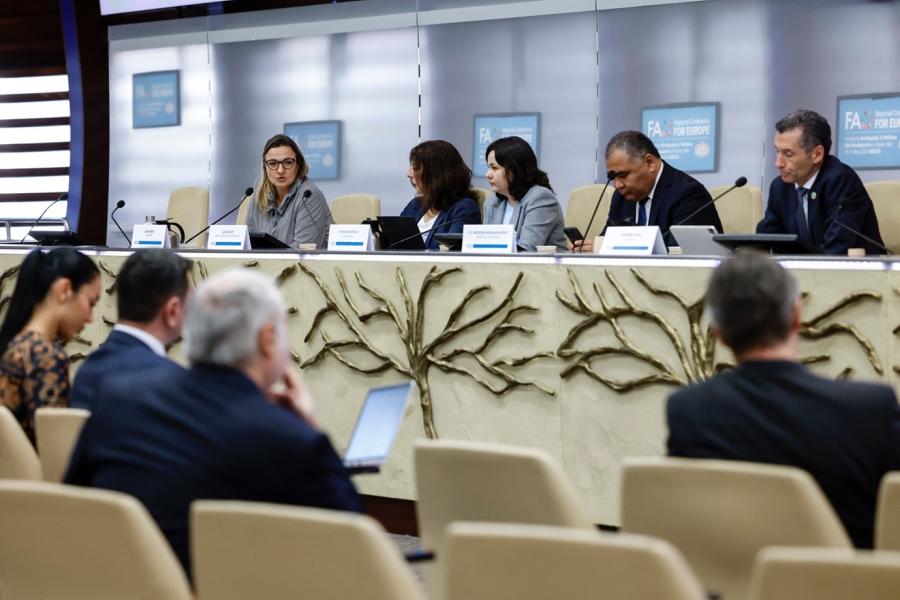Scaling up climate action in agrifood / FAO, countries, and partners prepare for UNFCCC COP29
17 may 2024
The UNFCCC COP29, scheduled for November 11-22, 2024, in Baku, presents an opportunity to highlight national and regional priorities in climate action and focus on the transformative potential of agriculture in the context of climate change

©FAO/Alessia Pierdomenico
16 May 2024, Rome – A high-level panel discussion at the 34th Session of the FAO Regional Conference for Europe (ERC34) addressed the urgent need for scaled-up climate action in Europe and Central Asia's agrifood systems. The discussion, titled "Climate Action in Agrifood Systems in Europe and Central Asia: Bridging and Aligning National and Regional Priorities and Global Commitments in the Context of UNFCCC COP29" highlighted the region's vulnerability to climate change and the importance of a coordinated approach ahead of the upcoming United Nations Climate Change Conference (UNFCCC COP29).
Climate change impacts agrifood systems worldwide, with the region of Europe and Central Asia being no exception. It leads to reduced agricultural productivity and disrupts food value chains, posing a significant threat to food security across the region. Adaptation and climate change mitigation are essential to ensuring that agrifood systems provide food and nutrition security for all.
FAO, jointly with the member countries and the regional and national partners, responds to the worldwide challenge of tackling the impacts of the climate crisis. Aligned with country priorities, the FAO Strategy on Climate Change 2022–2031 supports climate action in agrifood systems.
Raimund Jehle, FAO Regional Programme Leader for Europe and Central Asia, highlighted the development of a regional framework for Europe and Central Asia for applying the FAO Strategy on Climate Change and collaboration with Azerbaijan to integrate agrifood systems as part of UNFCCC COP29.
UNFCCC COP29: A platform for action
The UNFCCC COP29, scheduled for November 11-22, 2024, in Baku, presents an opportunity to highlight national and regional priorities in climate action and focus on the transformative potential of agriculture in the context of climate change.
Ilhama Gadimova, Deputy Minister of Agriculture of the Republic of Azerbaijan and a member of the Organizing Committee of the UNFCCC COP29, emphasized the country's commitment to leading discussions on the role of sustainable agrifood systems in climate action. She stressed the need for global unity and decisive action to address this pressing issue. “We aspire to see the world's leaders prioritize environmental sustainability and focus collaboratively on this pressing global issue during the conference”, said Ms Gadimova.
Nino Tandilashvili, First Deputy Minister of Environmental Protection and Agriculture of Georgia recognised the power of a combined approach to climate change and agriculture. Ms Tandilashvili emphasized that integrating "agrifood system solutions" into national plans like Nationally Determined Contributions, National Adaptation Plans, and long-term emissions reduction strategies is crucial for effectively tackling climate change. This focus on unified action is reflected in the government's policies and interventions.
A key priority at UNFCCC COP29 will be securing climate finance, particularly for adaptation and emissions reduction within agrifood systems. Deputy Minister Gadimova, Herwig Ranner, Team Leader, Directorate General for Agriculture at the EU Commission, and Luisa Rölke, Head of Division Climate Change and Water at Germany's Federal Ministry of Food and Agriculture, all highlighted the importance of climate finance and initiatives like the Food and Agriculture for Sustainable Transformation (FAST) Partnership in supporting capacity building and ensuring high-quality investments.
Julia Wolf, Natural Resources Officer at the FAO’s Office of Climate Change, Biodiversity and Environment echoed this sentiment. “Investing in agrifood systems is a key solution to climate change. Without increased investments, we run the risk of falling short of the targets set by the Paris Agreement and compromising our food security objectives. This is our key message we will advocate for.”
Luisa Volpe, Advocacy, Policy and Partnerships Practice Leader at the World Farmers’ Organisation (WFO emphasized that transforming agrifood systems should prioritize the well-being of farmers, as they are not only affected by climate change, but are integral to the solution.
Fostering regional collaboration for climate action
Highlighting the importance of regional collaboration for effective climate action, Ibrokhim Abdurakhmonov, Minister of Agriculture of the Republic of Uzbekistan, emphasized the need for coordinated efforts to align national and regional climate action priorities. Uzbekistan demonstrates its proactive approach to facilitating regional collaboration through the Central Asian Climate Dialogue.
Vladimir Grebnev, Regional Climate Change Specialist at the Central Asia Regional Economic Cooperation Program (CAREC) emphasized CAREC's support to member countries in aligning national and regional priorities, particularly in view of revising Nationally Determined Contributions (NDCs).
Building on past progress
The 2023 United Nations Climate Change Conference (COP28), which was hosted by the United Arab Emirates, in Dubai, in December 2023, achieved significant milestones. Agrifood systems took centre stage, with several important achievements, such as the COP28 UAE Declaration on Sustainable Agriculture, Resilient Food Systems and Climate Action, endorsed by 159 countries.
UNFCCC COP29 offers an opportunity to build upon this progress and advance climate action in Europe, Central Asia, and globally. All speakers underscored the urgency of implementing the Emirates Declaration and expressed optimism that UNFCCC COP29 will serve as a springboard for critical progress.
RELEVANT LINKS:
FAO Strategy on Climate Change 2022 – 2031
https://openknowledge.fao.org/items/7b9bf435-b12b-4abf-94c0-4806d3b97109
Collective challenges require collective solutions FAST
MEDIA CONTACT:
Oksana Sapiga
Communications Specialist
FAO in Europe and Central Asia



